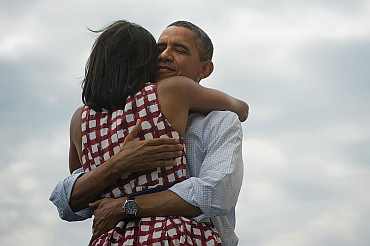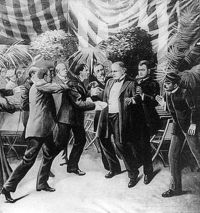Think of this as Volume 16, Number 46 of A-Clue.com, the online newsletter I've written since 1997. Enjoy.

call the Obama Thesis of Consensus.
It's a politics built on the idea
of compromise, on the need to come together and muddle through,
despite our sharp divisions.
There is tremendous power in that.
But
there are also limits, because none of the previous presidencies that
changed America, as this President has changed America, ended well.

born against a high political tide. It takes a crisis to change men's minds in fundamental ways. All our political eras have this in
common. They were born in times of enormous economic and social
upheaval.
The men who have birthed each era
weren't necessarily great men. Most of us believe Abraham Lincoln and
Franklin D. Roosevelt to have been great men. But was William
McKinley a great man? Was Richard Nixon?
All these men were, like Barack Obama,
products of their time. Their politics were born in leaning against
the assumptions of the previous generation. Obama was a Clinton-ite.
Nixon stood with Eisenhower. FDR stood with Woodrow Wilson. McKinley
was a Mugwump and of course Lincoln was a Whig, the party of Henry
Clay.
Each President had to transform the
anti-thesis that gave them political birth into something brand new,
something that could answer for a new set of challenges. Each
gained their opportunity because a fading economic order had taken
over the political sphere, had captured Washington in the name of a
scarcity that could not be maintained in any other way.
-
For Barack Obama, this is climate
change and the War Against Oil, with fossil fuels the source of
scarcity. -
For Richard Nixon, it was
technology and intellectual capital, with manufacturing productivity
the source of scarcity. -
For FDR, it was the tyrannies of the left and the right that had to be fought, but demand that was the source of scarcity.
-
For McKinley, unregulated
monopolies were the source of scarcity, in that monopolists could
change the price of industrial inputs at a whim and choke off
growth. -
For Lincoln, human labor was in
artificial scarcity, and manufacturing could address it.

battles, but social and political battles. We talk about the Civil
War, the Progressive Era, the New Deal, the 1960s, or the Age of
Obama as though they emerged full-blown from some great leader's
imagination. But they were all answers to economic pressures that
manifested in demands for social and political change.
Every leader must surf through their
times. They fight alligators, they don't see the swamp. But every new
source of scarcity creates an economic swamp that only new political
assumptions can address. Great Presidents start the process of
draining a swamp.
All of which means that Barack Obama
has now attained the political importance of William McKinley. Events
yet to be seen will decide whether he goes further.
But history does not promise a happy
ending.
Note what Lincoln, McKinley, FDR, and Nixon had in common?
Three died in office, and the other was pulled down by his own
hubris. Our chances of a Biden Presidency are better than 50-50. If Barack Obama survives his Presidency he will have beaten enormous odds.
Pray
for our leaders and the United States of America.










All these men were, like Barack Obama, products of their time. Their politics were born in leaning against the assumptions of the previous generation. Obama was a Clinton-ite. Nixon stood with Eisenhower. FDR stood with Woodrow Wilson. McKinley was a Mugwump and of course Lincoln was a Whig, the party of Henry Clay.
All these men were, like Barack Obama, products of their time. Their politics were born in leaning against the assumptions of the previous generation. Obama was a Clinton-ite. Nixon stood with Eisenhower. FDR stood with Woodrow Wilson. McKinley was a Mugwump and of course Lincoln was a Whig, the party of Henry Clay.
You made a point that stands even outside of the political arena. There is usually some sort of backlash against change. Something usually suffers. When the change is massive, it affects a lot of systems that were set in place and there are more reasons for a push back to occur against it.
When change occurs gently, people get more time to acclimatize to the new environment. In some cases, they don’t even notice that things are changing. However for a leader who wants to make their mark, they cannot afford to move so slowly. They must make an impact, that is why they were elected.
You made a point that stands even outside of the political arena. There is usually some sort of backlash against change. Something usually suffers. When the change is massive, it affects a lot of systems that were set in place and there are more reasons for a push back to occur against it.
When change occurs gently, people get more time to acclimatize to the new environment. In some cases, they don’t even notice that things are changing. However for a leader who wants to make their mark, they cannot afford to move so slowly. They must make an impact, that is why they were elected.